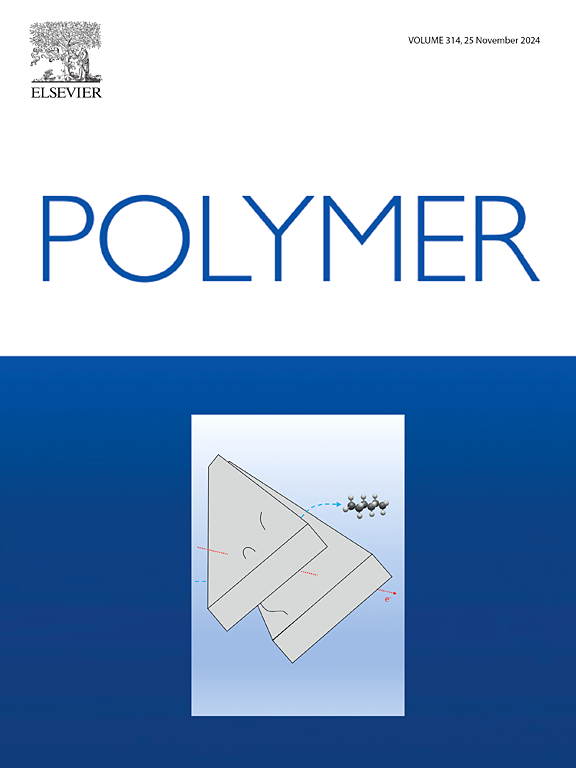Enhancement of physical and electrochemical properties of electrospun P(VdF-co-HFP) separators by incorporating magnesium borate for advanced lithium-ion batteries
IF 4.1
2区 化学
Q2 POLYMER SCIENCE
引用次数: 0
Abstract
In this study, fibrous membrane composites containing poly (vinylidene fluoride-co-hexafluoropropylene) P(VdF-co-HFP) copolymer and various amounts of magnesium borate Mg2B2O5 were prepared via electrospinning method. The crystallization behavior, thermal stability, microstructure, porosity, liquid electrolyte uptake and electrochemical performance of electrospun membranes were investigated in detail. X-ray diffraction (XRD) and differential scanning calorimetry (DSC) show that, the crystallinity of P(VdF-co-HFP) tends to decrease with increasing amount of Mg2B2O5 particles. The electrospun membrane containing P(VdF-co-HFP) and 2.5 wt% of Mg2B2O5 demonstrates stronger anti-shrinkage properties compared to those of commercial polypropylene (PP) or pure P(VdF-co-HFP) separators at 140 °C. The fibrous membrane consisting of 2.5 wt% Mg2B2O5 exhibits high electrolyte uptake (381 %), low interfacial resistance and good porosity at room temperature (81 %), even after heating at 140 °C the porosity becomes 78 %. Moreover, Li||LiFePO4 cell using P(VdF-co-HFP) separator with 2.5 wt% of Mg2B2O5 shows better discharge capacities of 167.5 and 146.8 mAh g−1 at 0.2 C and 5 C, respectively, compared to those of commercial PP separator which delivers only 158 and 127 mAh g−1 at 0.2 C and 5 C, respectively. [P(VdF-co-HFP) + 2.5 wt% Mg2B2O5] separator also provides discharge capacity retention of 99.9 % after 100 cycles at 9 C, in comparison with only 87 % for polypropylene separator. Such results reveal that P(VdF-co-HFP) membrane containing 2.5 wt% Mg2B2O5 is a highly promising separator with good safety which can be used in high-performance lithium-ion batteries.


通过在先进锂离子电池中加入硼酸镁提高电纺 P(VdF-co-HFP)隔膜的物理和电化学性能
本研究通过电纺丝方法制备了含有聚偏氟乙烯-六氟丙烯(P(VdF-co-HFP)共聚物和不同量的硼酸镁 Mg2B2O5 的纤维膜复合材料。详细研究了电纺丝膜的结晶行为、热稳定性、微观结构、孔隙率、液体电解质吸收和电化学性能。X 射线衍射(XRD)和差示扫描量热法(DSC)显示,P(VdF-co-HFP)的结晶度随着 Mg2B2O5 颗粒含量的增加而降低。与商用聚丙烯(PP)或纯 P(VdF-co-HFP)分离剂相比,含有 P(VdF-co-HFP)和 2.5 wt.% Mg2B2O5 的电纺膜在 140 °C 下具有更强的抗收缩性能。由 2.5 wt.% Mg2B2O5 组成的纤维膜在室温下具有高电解质吸收率(381%)、低界面电阻和良好的孔隙率(81%),即使在 140 °C 下加热后,孔隙率也达到了 78%。此外,使用含有 2.5 wt.% Mg2B2O5 的 P(VdF-co-HFP)隔膜的 Li||LiFePO4 电池在 0.2 摄氏度和 5 摄氏度时的放电容量分别为 167.5 mAh g-1 和 146.8 mAh g-1,而使用商用 PP 隔膜的电池在 0.2 摄氏度和 5 摄氏度时的放电容量分别只有 158 mAh g-1 和 127 mAh g-1。[P(VdF-co-HFP) + 2.5 wt.% Mg2B2O5]分离器在 9 C 下循环 100 次后,放电容量保持率也达到 99.9%,而聚丙烯分离器的放电容量保持率仅为 87%。这些结果表明,含有 2.5 wt.% Mg2B2O5 的 P(VdF-co-HFP)膜是一种极具潜力的隔膜,具有良好的安全性,可用于高性能锂离子电池。
本文章由计算机程序翻译,如有差异,请以英文原文为准。
求助全文
约1分钟内获得全文
求助全文
来源期刊

Polymer
化学-高分子科学
CiteScore
7.90
自引率
8.70%
发文量
959
审稿时长
32 days
期刊介绍:
Polymer is an interdisciplinary journal dedicated to publishing innovative and significant advances in Polymer Physics, Chemistry and Technology. We welcome submissions on polymer hybrids, nanocomposites, characterisation and self-assembly. Polymer also publishes work on the technological application of polymers in energy and optoelectronics.
The main scope is covered but not limited to the following core areas:
Polymer Materials
Nanocomposites and hybrid nanomaterials
Polymer blends, films, fibres, networks and porous materials
Physical Characterization
Characterisation, modelling and simulation* of molecular and materials properties in bulk, solution, and thin films
Polymer Engineering
Advanced multiscale processing methods
Polymer Synthesis, Modification and Self-assembly
Including designer polymer architectures, mechanisms and kinetics, and supramolecular polymerization
Technological Applications
Polymers for energy generation and storage
Polymer membranes for separation technology
Polymers for opto- and microelectronics.
 求助内容:
求助内容: 应助结果提醒方式:
应助结果提醒方式:


